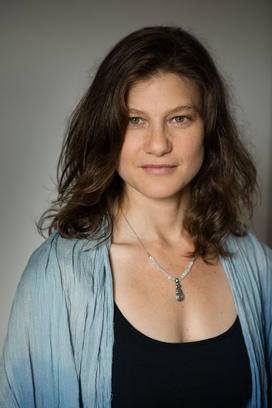Marianne Apostolides ’94 Shares Parts of her New Memoir in a Multimedia Collaboration

Author Marianne Apostolides ’94 writes in a style that practically begs to be read aloud.
“In all of my writing, there’s a really insistent rhythmic quality — it’s quite aural,” she says. “In many ways, once I find the rhythm, then the book unfolds. … The ideas emerge, as a book, once I find that pulse.”
But even after she has committed her carefully crafted lines to print, Apostolides occasionally finds herself tinkering. When she performed readings of her last novel, Sophrosyne, she would make notes whenever the cadence seemed to falter. She made edits to the text for the book’s second edition, released after the initial print run sold out. (“My publisher was not happy with me,” she says with a laugh.)
For Apostolides’ next book, Deep Salt Water, she is smoothing any wrinkles in the rhythm in advance. After recording the entire book, she selected nine pieces from her work to share with an online audience. Readers can hear excerpts read by the author, with a soundscape by composer Paul Swoger-Ruston, on the Room magazine website.
The audio is part of an interdisciplinary collaboration that also includes collages by artist Catherine Mellinger and images from photographer Melanie Gordon.
Deep Salt Water, which will be published in April 2017, is a deeply personal memoir covering diverse themes, including abortion, relationships, and the science of climate change. It is composed of 37 pieces, one for each week in a full-term pregnancy.
Apostolides is no stranger to memoir, or to difficult subject matter. In her first book, Inner Hunger, she shared her struggles with anorexia and bulimia, which lasted nearly a decade, including her four years at Princeton. The book, published by W.W. Norton in 1998, earned acclaim and gave Apostolides, a politics major, confidence to follow a path in creative nonfiction. But it was her next project — a memoir about her father’s childhood in Greece — that solidified her love of writing.
“It took me many years to write, and many rejections — very different from the first book, where it just sort of happened,” she says. “I think I became a writer through the failure of that book, through writing and rewriting. … I found determination and desire to continue. It was so basic to who I am — this was not a career choice, this was an essential need of my soul.”
While searching for the right way to tell her father’s story, Apostolides began to engage in the experimental literature scene in Toronto, where she lives, and try new styles of writing. Since then, her work has included novels, nonfiction essays, and her first play, Feast. Last year, she received a grant to develop the play with a choreographer, a director, and a cast of actors and dancers.
“It was so amazing to be in a room with 12 other artists, creating together,” Apostolides says. “The energy in that room was something I had never experience before, because as a writer, it is day after day, alone at a desk, with your pen and your thoughts. … The collaborative process was so supportive.”
READ AND LISTEN: Excerpts from Deep Salt Water — 1 - 2 - 3 - 4











No responses yet